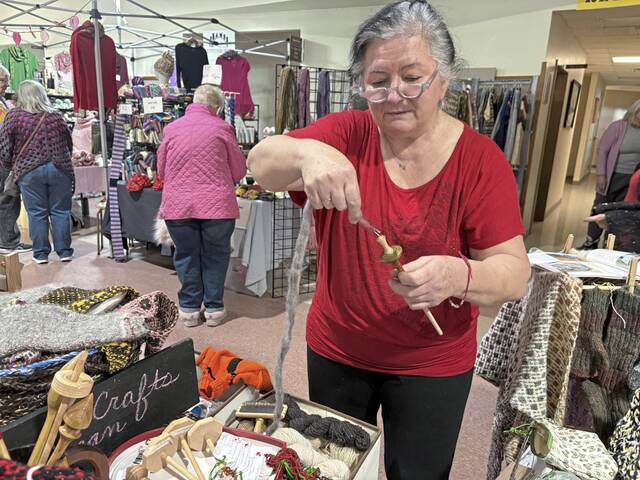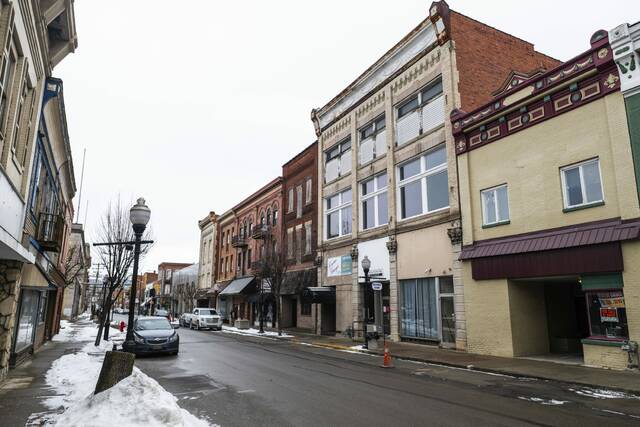Curled up in a ball inside the courthouse, a little boy was too terrified to speak about the sexual abuse he endured.
A therapy dog from Center for Victims made its way over to the boy and lay down.
The boy, hesitant, started petting the dog’s fur.
“Can he come with me?”
“Yes,” said Laurie MacDonald, president of Center for Victims, a nonprofit organization that provides services, advocacy and education for victims of all crime.
With the dog at his side, “he went in and testified,” MacDonald said.
Funding for the canine program has since been revoked, and, like dozens of rape crisis centers across Pennsylvania, Center for Victims has struggled to maintain services amid five years of flat state funding — and Gov. Josh Shapiro’s proposed 2025-26 budget offers no relief.
Flat funding’s faults
For rape crisis centers, the Pennsylvania 2025-26 budget suggests the possibility of entering a fifth year without increases in funding.
Pennsylvania Coalition to Advance Respect Director and Chief Operating Officer Joyce Lukima said the centers have felt the impact of the stagnant budget since 2021.
“It is an incredibly stressful time for rape crisis centers,” Lukima said. “The cost of everything has increased, so not having an increase in funding is basically like having a decrease.”
Documents from the Office of the Budget show that in 2021-22, the state gave centers an additional $1,000, which brought funding from $10,921 up to $11,921.
Since then, the budget line has remained consistent.
Last year, domestic violence received a 12.4% increase, which brought funding to over $22,000.
Since domestic violence received additional funding last year, many rape crisis advocates thought the upcoming year might mean more money.
However, the 2025-26 budget proposes allocating the same amount — $11,921 — to rape crisis once again, according to the Commonwealth’s 2025-26 Proposed Budget Line-Item Appropriation.
Gabriella Romeo, PCAR’s public policy director, said all services provided to survivors are free of charge and designed to offer robust services, where people can walk into a center and easily find a program equipped to meet their needs.
“It’s hard for people to understand … the cost of what it takes to run an organization that provides 24/7 care for survivors of sexual abuse, assault and harassment is incredible,” Lukima said.
Many people do not realize that domestic violence and rape crisis are separate entities, Romeo said.
“We’ve had to explain, ‘Well, actually, no, we didn’t get that. That was not for the rape crisis line item.’ Now, some of our programs are dual programs, meaning they receive funding from both domestic violence and sexual assault. So, some programs would have benefited from that line item, but not all of our rape crisis programs,” she said.
The budget for domestic violence also will not increase this year, according to the 2025-26 proposed budget.
While the rape crisis item line has been flat-funded, there are other ways victims of sexual violence might receive support.
Shapiro proposed a $9 million investment in the Pennsylvania Commission on Crime and Delinquency’s Victims Compensation Assistance Program in the 2025-26 state budget to help stabilize the fund, according to a news release.
VCAP serves as a critical financial lifeline for individuals affected by crime. However, the money goes directly to a victim rather than to a crisis center.
Since 2021, the program has paid more than 27,300 claims totaling over $24 million for costs associated with sexual assaults, said Alison Gantz, a spokeswomen for the Pennsylvania Commission on Crime and Delinquency.
“Gov. Shapiro’s proposed 2025-26 budget provides grant funding for rape crisis services for approximately 25,000 victims of sexual violence and their significant others. Rape crisis centers, as well as domestic violence programs, and their staff need and deserve continued support, and DHS continues to work with our partners in the General Assembly to support these centers,” press secretary Brandon Cwalina said Thursday in a statement to TribLive.
Shapiro’s office did not answer specific questions about why the rape crisis item line had been flat-funded or address concerns from rape crisis centers that say they will struggle to maintain legally required services without increased financial support.
‘Horrible for survivors’
Center for Victims’ canine advocacy program, as described on its website, “aims to reduce physiological, emotional and psychological impacts on individuals involved in criminal investigations or legal proceedings by utilizing the calming presence of highly trained dogs.”
It is not the only program feeling the effects of flat funding.
While MacDonald has been able to fundraise in order to keep providing furry friends to survivors, not all programs have been as fortunate.
“I’ve had a program who had a human trafficking resource room that could be used if maybe a survivor of trafficking needed a safe place to stay overnight and they worked in conjunction with law enforcement as a resource,” Romeo said. “They ended up having to decide between cutting a staff member or cutting that resource.”
The program ultimately had to stop offering the resource to victims of trafficking, she said.
Renee Reitz is executive director of Blackburn Center, an anti-violence organization in Greensburg. She said the agency has begun looking into which services it is going to have to cut if the 2025-26 proposed budget passes.
The first thing being cut is education.
Blackburn Center uses a large portion of its rape crisis funding to provide educational programming, such as awareness and prevention education for students across schools in Westmoreland County. However, after five years, the center won’t be able to continue operating the same way.
“If we get level funding, (it’ll be) horrible for the survivors, horrible for the community, and we are going to see the impact,” Reitz said. “If we do not get (more) funding, we are going to see an uptick with sexual violence.”
Secondary trauma and turnover
Many rape crisis centers experience frequent staffing turnover.
Romeo said this stems from two factors: “secondary trauma” from advocating for survivors of sexual abuse, harassment and rape, and low pay for hours worked.
“Operational costs are going up. How are we able to pay our staff to do the work that’s necessary when they’re wearing so many hats and the vicarious trauma piece?” Reitz said.
According to Romeo, once staff members leave, the centers are then forced to decide between taking on a new hire or maneuvering around existing staffers to cover the responsibilities of the now-open job. Often, they decide that it will take more resources to train someone new in the position and the workload of what would typically fall to five advocates then falls to three.
“I just think at this point, we’re at an extremely critical time,” Lukima said.
Sadie Restivo, executive director of Pittsburgh Action Against Rape, said the bulk of the organization’s budget is paying employees’ salaries. This is difficult because of the services that rape crisis centers are legally required to provide, such as staffing a 24/7 helpline and responding to all calls from medical or legal law enforcement within an hour of receiving them.
“It’s getting increasingly difficult to be able to respond when funding just is not matching the need,” she said.
Could more be done?
MacDonald said she doesn’t know why domestic violence received increased funding last year and rape crisis did not.
She blames the Pennsylvania Coalition Against Domestic Violence and Respect Together, which is made up of the National Sexual Violence Resource Center and PCAR.
“If it’s anyone’s fault, it’s theirs,” MacDonald said. “(Coalitions are) not focused on the people who are really being tortured out here by predators.”
MacDonald feels that within recent years, the coalitions have not been advocating to legislators as much as previous years.
“At least I don’t see it,” she said.
Romeo responded to that statement by citing several of PCAR’s lobbying efforts over the past year, including ongoing meetings with Shapiro’s office, the Department of Human Services, Congress and appropriations chairs. She also mentioned the organization’s requests since 2024 for an $8 million increase to the rape crisis line item.
“That increase,” Restivo said, “gets divided among the centers by the size and population and the hours of services, depending on what county that you’re in. For somewhere like PAAR, it could really change the outcome of this year’s budget for us.”
PCAR also hosted virtual funding meetings about the impact of flat funding, forwarded letters to Congress, attended the Western Pennsylvania Advocacy Day in April and held a Rally for Survivors at the state Capitol.
Reitz believes PCAR has been active in working with legislators.
“I’ve met with (PCAR) to meet with legislators,” Reitz said. “I feel that we are doing everything.”

















